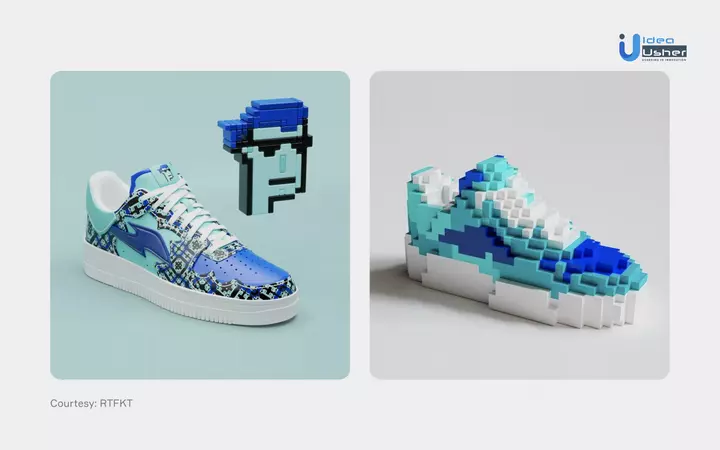
Along with games and arts, wearable NFT has become a trend. As per the report, the market size of non-fungible tokens is projected to reach $8,412M by 2027 at a CAGR of 22.91%.
Non Fungible tokens have expanded their uses among multiple industries, be it gaming, music, digital arts, and much more. The fashion industry is also among them.
Many fashion brands have launched their collections on different marketplaces.
Also, it is a great opportunity for anyone to make extreme profits by building a marketplace and taking a commission on each sale.
In detail, let’s understand these NFTs and know the best way to create a platform that allows users to create and trade their virtual clothing and accessories.
What are wearable NFTs?
Wearable NFTs are virtual clothing or digital accessories like shorts, dresses, jeans, glasses, bags, etc that users can use on their virtual avatars in different metaverse platforms and games.
All these designs are made with the help of blockchain technology and smart contracts to help creators bring uniqueness, authenticity, and secure ownership to their every garment. Check the best platforms to create your smart contracts.
The concept of the virtual fashion industry has existed for decades. For example, you may have seen virtual cloth accessories in popular games like The Sims or the Second Life.
Moreover, popular luxury brands have entered this virtual industry and are expected to take this market worth around $56B by 2030. Last year, Louis Vuitton launched their metaverse game, where players can collect virtual assets.
Moreover, many other fashion brands, including Adidas, GAP, Nike, and Crocs, have joined the bandwagon to offer virtual wardrobes to customers.
What makes wearable NFTs so special?
Everyone wants to create their unique identity in virtual worlds by wearing incredible virtual fashion collections. These collections help users bring uniqueness to their virtual profiles.
However, many reasons make these virtual assets so appealing that we have discussed below.
1. Endless creativity
In this virtual fashion industry, fashion has gone beyond fabric. Now the brands are experimenting with virtual fashion accessories with unrealistic materials such as gold, water, smoke, and much more.
There are many endless possible ways by which brands can experiment with their virtual clothing and wearable accessories, which is impossible to experiment with in the real world.
2. Body and gender inclusivity
There is no limitation to the body shape and size in virtual industries. Moreover, users can try virtual accessories of their opposite gender by customizing their virtual avatars in the digital world.
3. Accessibility
Compared to real-life fashion accessories, the virtual fashion industry offers affordability where anyone can try different and unique clothing on their virtual avatars.
Moreover, there are no limitations or boundaries where anyone can try different fashion accessories that are available all around the world. That’s not possible in the case of the real-life fashion industry.
4. Availability
There is no such thing as the unavailability of fabric in the virtual world as that happens in the real world. Brands can produce unlimited copies of fashion accessories and clothing with this virtual fashion industry.
5. New business models
Businesses can explore different monetization models to maximize profits by selling their garments in the virtual world. Moreover, the brands can generate a high income as royalties on each sale of their digital assets.
6. Waste reduction
There is no involvement of carbon emissions in the production of virtual fashion accessories (giving better results to fashion brands for contributing to saving the environment).
Moreover, with the help of the virtual fashion industry, there is no need for fashion brands to create their actual fashionable clothes that involve the consumption of a lot of natural materials and fabrics.
Not needing actual fabric material saves the environment from the over-consumption of natural sources by the fashion industry.
Check the list of best digital fashion brands for taking ideas and inspiration for your marketplace.`
Best digital fashion brands
You can take ideas and inspiration from the best fashion brands available on different platforms.
1. The Fabricant
This Amsterdam-based digital fashion house has partnered with popular fashion brands such as Puma and Buffalo London to showcase their virtual fashion accessories on different platforms.
The fabricant was the first to use blockchain technology in the fashion industry to showcase its accessories as virtual assets.
2. Auroboros
This brand focuses on a sci-fi theme culture where it offers a perfect match for users in the metaverse. The brand offers virtual clothes based on different sci-fi themes.
Auroboros has launched many popular metaverse-based fashionable clothing and accessories such as Neuro necklaces, Nymph bags, and Venustrap dresses.
3. Republiqe
When it comes to designing eye-catchy virtual garments, Republiqe is the world’s first digital-only luxury fashion brand. The brand has one of its popular puffer jackets that was released in celebration of world health day.
Now let’s check out the best digital marketplace where you can purchase fashionable accessories for your virtual avatars.
Top digital wearable NFT marketplace
Here is the top places to buy virtual accessories for digital profiles and collectibles:
1. The Dematerialised
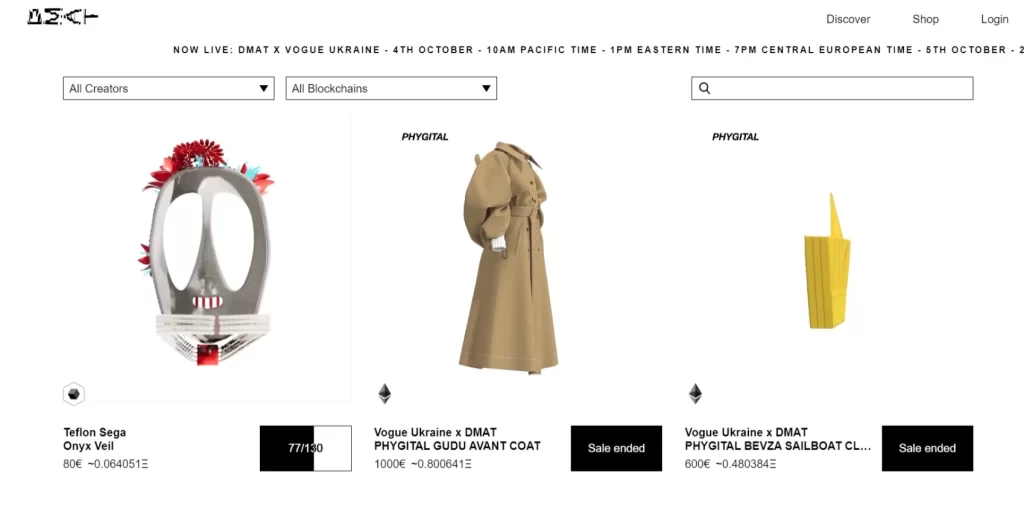
The invite-only virtual fashion marketplace offers a wide variety of fashionable accessories where users can purchase fashionable items from popular brands like Tribute, RTFKT, and The Fabricant. The marketplace is built on LUKSO and Ethereum blockchain technology. Users can explore wearables into multiple categories: clothes, glasses, footwear, jewelry, and much more.
| Launched in | 2020 |
| Headquarters | London, England |
| Founded by | Marjorie Hernandez |
| Available on | Web |
2. DressX
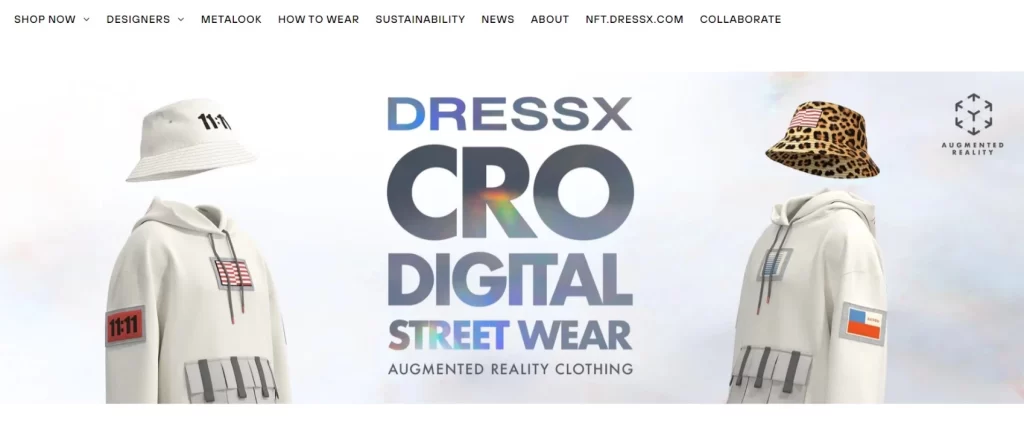
With its popular tagline, “don’t shop less, shop digital”, DressX is a digital marketplace where users can purchase virtual clothing in-house and in partnership with reputed fashionable brands. DressX has recently partnered with the popular exchange platform crypto.com to offer their users limited edition drops and exclusive items.
The platform offers a gateway for their users to trade digital assets across popular marketplaces, including OpenSea and Rarible.
| Launched in | 2019 |
| Headquarters | Los Angeles, USA |
| Founded by | Natalia Modenova |
| Available on | Web, Android, iOS |
3. Metajuku
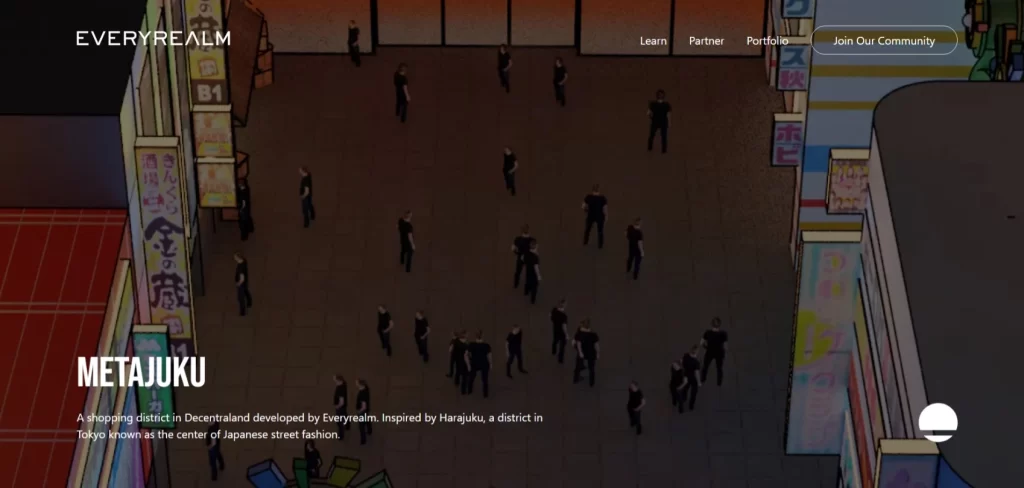
The platform is inspired by Tokyo’s Harajuku. Metajuku is a virtual shopping platform that is available on a popular metaverse platform called Decentraland. This marketplace offers its digital virtual mall where multiple digital wearables and 3D designs are available.
| Launched in | 2022 |
| Headquarters | New York, USA |
| Founded by | Every realm |
| Available on | Windows & macOS |
How to build your marketplace?
Building a non-fungible token trading platform offers an excellent opportunity for anyone to make extreme profits from traders and creators.
It will be best to hire blockchain developers to create your marketplace, as they will help you build your platform from scratch. Also, it is advisable for you to go for creating a cross-chain NFT marketplace for allowing users to buy and trade virtual clothing.
Let’s check the detailed steps to build your marketplace where you can allow users to trade digital wearables.
1. Research your competitors and audience
Knowing your targeted industry will benefit you in the long term.
When creating your virtual accessories marketplace, it will be best to study your target audience and competitor to develop the best ideas to help you build your trading platform.
When researching your project, consider:
- The crypto wallets you will support on your platform.
- NFT standard to allow your users to mint their virtual assets.
- Top features and functionalities that you want on your digital wearable trading platform.
2. Make a collection of good virtual wearables
It would be best to create attractive wearable collections and list them on your trading platform so that you can attract a large audience to your platform.
Once you get a massive audience base, you can provide them with multiple features that will help creators upload their wearables on your trading platform. To make a good collection of digital wearables, hire graphic and 3D designers.
You can narrow your target audience by creating wearables for specific industries such as games, music, traveling, etc. Narrowing down your focus will help you get more targeted users on your platform.
3. Hire blockchain developers
This is a development part of your platform creation journey. The team will build your digital variable trading platform with all the required and decided features and functionalities.
When hiring a blockchain developer for your project, ensure you have gone through the following.
- Checking their portfolio of past published apps, especially for the marketplace.
- Knowing the budget for building your marketplace.
- Developers’ recommendations for the best blockchain networks and crypto wallets.
4. Offer easy navigation with engaging UI
The team you have hired for your project will start creating prototypes for your digital asset trading platform. You can provide them with references to multiple marketplaces from which you have taken inspiration for your project.
Moreover, hiring a good team of app developers will help you suggest the best designs and UI for your trading platform.
When working on your platform’s design, ensure:
- The user interface is simple and accessible to explore all the features that help users to purchase and mint their art.
- An attractive home screen where you can showcase the collections of maximum digital wearables as possible.
- Precisely putting all the buttons and widgets to help your users to navigate your platform to trade digital assets easily.
5. Build the decided marketplace features
Once finishing the prototype of your trading platform, the developers will start building all the decided features. Also, they will integrate the backend to the frontend part of your app to make it fully functional.
The developers will start putting the required features into your digital wearable trading platform, such as:
- Features for allowing users to mint their virtual assets on your marketplace.
- Crypto wallet integration through which users can purchase available digital accessories on your platform.
- Bidding options through which creators can sell their art to their preferred buyers.
6. Make your marketplace better with quality testing
Your trading platform is ready to launch. Still, you will need to perform platform testing multiple times until you are satisfied with the quality of your marketplace. Performing testing will help you identify all your trading platform’s technical glitches and drawbacks.
Moreover, you can perform beta testing where selected users will submit their reviews about their experience when using your digital marketplace. You can modify your platform on their feedback to offer a great experience to a wide range of audiences.
7. Launch your marketplace
After platform testing, you can launch them to your preferred blockchain network, allowing users to purchase digital accessories available on your marketplace.
You can perform multiple marketing practices such as AirDrop, content marketing, social media marketing, and others to attract a targeted audience to your marketplace.
8. Upgrade and maintain
After a few months of launching your platform, you can add new features and functionalities to offer your users a better experience for trading virtual assets on your marketplace.
You can hire the same blockchain developers to add new features who created a platform for your marketplace.
What is the best way to create your virtual wearable platform?
To hire blockchain developers, you can choose among three options, i.e., hiring in-house, freelancers, or outsourcing your project to development agencies.
Hiring freelancers involves risk, such as they might leave your project in the middle while hiring in-house developers contain too many expenses, such as paying them monthly salaries and taking office on rent.
To get the best results on your project, it is advisable to go for outsourcing your project to the development agency. They contain all the required professionals, such as developers, graphic designers, and project managers, to help you build and launch your marketplace.
Contact Idea Usher to create a virtual wearable marketplace
If you are looking to take blockchain development services where the team will help you from market research to publishing your marketplace to your preferred blockchain network. You can contact Idea Usher.
Idea Usher is an app development company with experience in various industries for building and publishing apps for their clients. Schedule a free consultation call with our team to discuss your project.
Contact Idea Usher
Email:
Phone:
FAQ
1. What is an NFT wearable?
These are virtual fashion clothing, and accessories users can put on their virtual avatars. This can be dresses, jeans, glasses, bags, and other accessories.
2. How do I create a wearable NFT marketplace?
You can follow the given development steps to create your marketplace where users can trade virtual fashion clothing:
- Research your competitors and audience
- Make a collection of good virtual wearables
- Hire blockchain developers
- Offer easy navigation with engaging UI
- Build the decided features
- Make your platform better with quality testing
- Launch your app
- Upgrade and maintain your platform
3. What are the best wearable NFT marketplaces?
Here are the five platforms to check for virtual fashion and accessories:
- The Decentraland
- DressX
- Zero10
- Zara
- H&M Loop island
4. How does a wearable NFT marketplace work?
Here are the working steps of the virtual accessories marketplace:
- Users join the platform with their crypto wallets
- For creators, they upload their digital wearables
- Once it gets uploaded, it gets tokenized in digital assets
- While buyers explore the platform to purchase collections
- Users join the platform with their crypto wallets
- Once purchased, the virtual items will be swapped to their crypto wallets






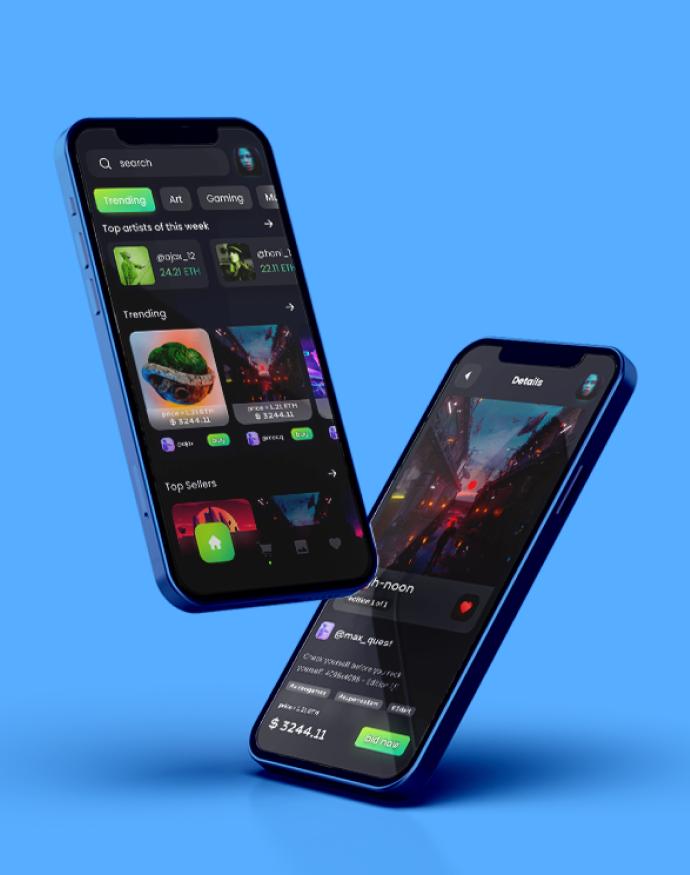


Gaurav Patil